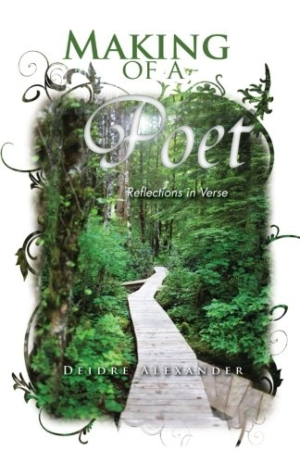Making of a Poet
Reflections in Verse
There’s a curious trend among some contemporary poets to produce collections that include annotations, backstory, and personal history. In the introduction to Deidre Alexander’s Making of a Poet: Reflections in Verse, editor J. Ralph Otte explains why he and the poet decided to divulge the “wider story” behind the poems in the collection. While it’s admirable to provide anything that will enrich content, it raises the question of whether such measures do anything more than expose the scaffolding. If the poet is doing her job, is it necessary to provide additional “explanation”? There are certainly books in which poets describe their own creative processes, to illuminate the inception and execution of a particular piece, but in those cases the poems stand alone.
Had Alexander’s title identified the book as an interdisciplinary journal or diary, it would have better reflected the content, which includes poems, photographs, writing exercises, and notes. Making of a Poet is arranged in chronological order, beginning with pieces written in junior high hchool and extending through college and beyond. Alexander writes introductions to each chapter, listing the particular events from a particular stage in her life: a trip to Yosemite, a close friend discovered in the dormitory, a religious awakening. Considering the pains she’s taken to be forthcoming, it’s surprising to discover how much of this collection feels cursory and withdrawn.
If there were a single word to explain the problem with Making of a Poet, that word would be ambivalence. The numerous fonts and prose additions would seem to bear this out. Alexander seems to have a sincere desire to invest her writing with substance and genuine emotion. Yet she neglects meaningful divulgence, original details, and the poetic tools that make leaps of fancy and intensity possible. She offers momentary glimpses of something compelling, but fails to pursue them. In “Full Moon Fantasies?,” She describes a tableau in which a surprising event occurs: “It was not the cry of a bird or someone speaking, / but a pay phone ringing! // Should you answer it?” This is an excellent premise for a poem that could be eerie, enigmatic, and intriguing. Instead, the line breaks are pedestrian, and the ending is derivative. Opportunities to take the reader to a place that is truly memorable are missed.
There is no doubt that the writing in Making of a Poet comes from an author who is intelligent, wise, and emotionally evolved. But Alexander seems to mistake efficiency for brevity, failing to imbue her work with the gravity, density, or even playfulness necessary to draw in the reader. Instead of providing unique insight and imagery, she settles for diction that is predictable and slight. For readers who can appreciate a memoir solely on the basis of its content, Making of a Poet may appeal.
Reviewed by
Christopher Soden
Disclosure: This article is not an endorsement, but a review. The publisher of this book provided free copies of the book and paid a small fee to have their book reviewed by a professional reviewer. Foreword Reviews and Clarion Reviews make no guarantee that the publisher will receive a positive review. Foreword Magazine, Inc. is disclosing this in accordance with the Federal Trade Commission’s 16 CFR, Part 255.

